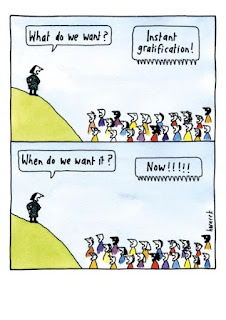INSTANT GRATIFICATION

“ Technology wants what life wants. Increasing efficiency; increasing opportunity; increasing emergence; increasing complexity; increasing diversity; increasing freedom; increasing beauty and increasing evaluability”, said Kevin Kelly according to Wu (2014). Technology’s advancements have us wanting instant connection, instant updates, and instantly having a page load. Waiting for anything to load or change over, because of slow internet or weak Wi-Fi signal has somehow become frustrating to us and feels like forever. It becomes really annoying like we don’t have time for it, yet is just a few seconds more. According to Muther (2013), the demand for instant results is seeping into every corner of our lives, and not just virtually. It happens when at stores, in traffic and even waiting for coffee, I see the impatience in people. As Muther points out, instant gratification come at a price: it’s. Making us less patient. We have come as a society to expect things now and quickly that i
